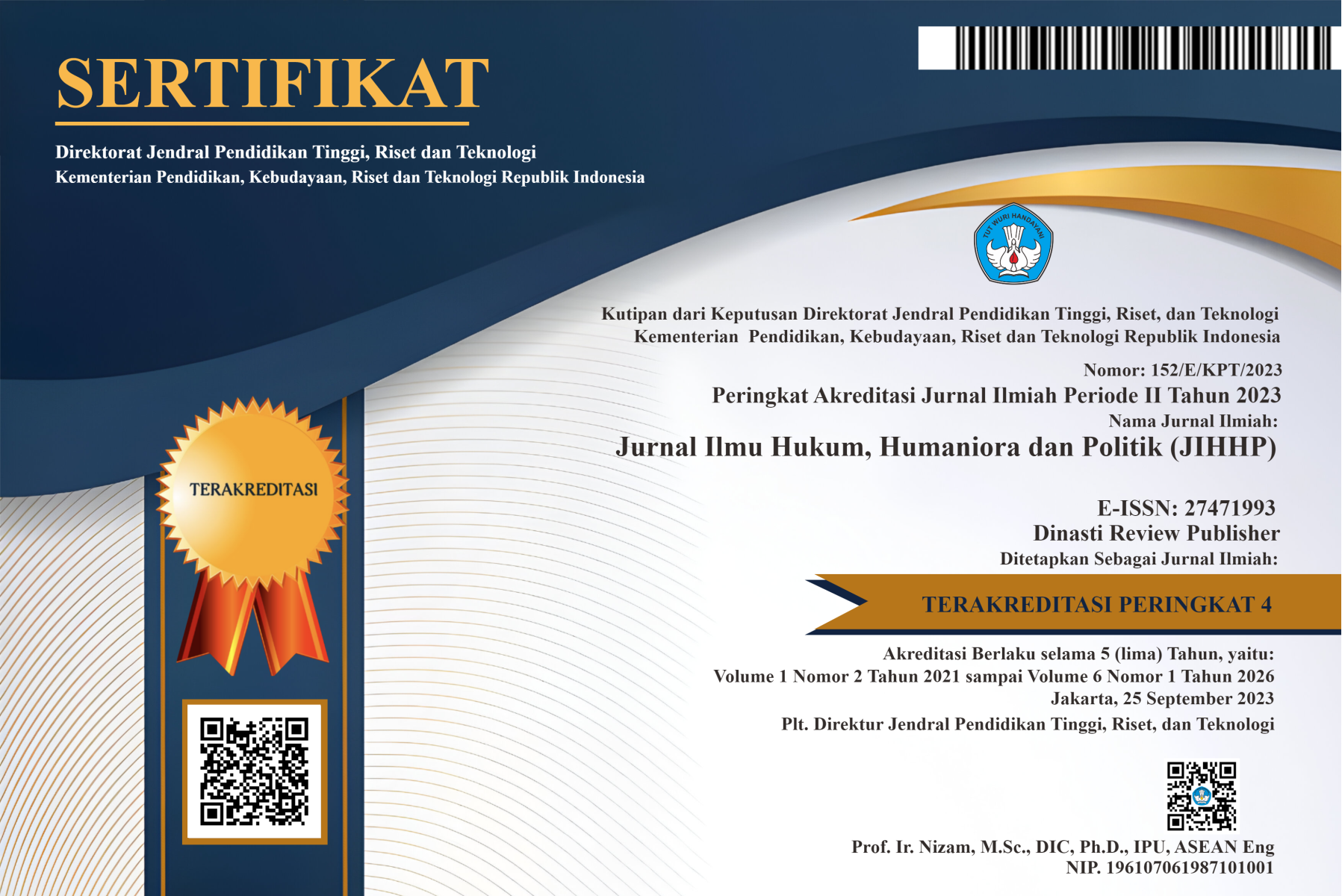Analisis Yuridis Ketentuan Negara Tuan Rumah Dalam Kegiatan Foreign Direct Investment (FDI) Berbentuk Joint Venture
DOI:
https://doi.org/10.38035/jihhp.v4i4.2114Keywords:
Foreign Direct Investment, Host-State Obligations, Obligations of the host state, Joint Venture, Law of the Republic of Indonesia Number: 25 of 2007 Concerning Investment.Abstract
In 2023, Indonesia is expected to continue attracting foreign direct investment through joint ventures. The Indonesian government has actively promoted foreign direct investment (FDI) and facilitated Joint Ventures to attract foreign capital and expertise. Foreign Direct Investment (FDI) is a direct investment made by foreign companies in the host country. One common form of FDI is a joint venture, where a foreign company and a local company work together to form a new entity that will operate in the host country. In this context, juridical analysis refers to research and evaluation of the legal provisions applicable in the host country related to FDI activities in the form of joint ventures. This analysis involves understanding the legal regulations governing the formation, operation and termination of joint ventures, as well as the legal protection provided to the parties involved in these activities. Juridical analysis of the host country's provisions for FDI activities in the form of joint ventures is important to understand the applicable legal framework and ensure compliance with existing regulations. This can also help the parties involved in the joint venture to protect their rights and interests and minimize any legal risks that may arise.
References
Abdullah, Sayidin. “Politik Hukum Penanaman Modal Asing Setelah Berlakunya Undang-Undang Penanaman Modal 2007 dan Implikasinya Terhadap Pengusaha Kecil.” FIAT JUSTITIA: Jurnal Ilmu Hukum 8, no. 4 (Agustus 14, 2015): 546–570. https://jurnal.fh.unila.ac.id/index.php/fiat/article/view/320.
Acconci, Pia, Mara Valenti, dan Anna De Luca. General Interest of Host States in International Investment Law. Cambridge: Cambridge University Press, 2014.
Adolf, Huala. Hukum Perdagangan Internasional. Jakarta: Raja Grafindo Persada, 2005.
Baltag, Crina. “Investment Arbitration and Police Powers: Emerging Issues.” European Investment Law and Arbitration Review Online 5, no. 1 (2020): 392–399.
Dolzer, Rudolf, dan Christoph Schreuer. Principles of International Investment Law (2nd Edition). America: Oxford Public International Law, 2012.
Goodwin-Gill, Guy S. International Law and the Movement of Persons Between States. America: Oxford University Press, 1978.
Hoogvelt, Ankie, dan Anthony G Puxty. Multinational Enterprise: An Encyclopedic Dictionary of Concepts and Terms. London: The Macmillan Press Ltd, 1987.
Indiarti, Ivon Sri Putri, Susilowati S. Dajaan, dan Nyulistiowati Suryanti. “Analisis terhadap Perlindungan Investor Asing dalam Kegiatan Penanaman Modal Asing di Indonesia terkait Kepastian Hukum dalam Izin Penguasaan Hukum atas Tanah.” Universitas Padjadjaran, 2019.
Khirandy, Ridwan. “Kompetensi Absolut Dalam Penyelesaian Sengketa di Perusahaan Joint Venture.” Jurnal Hukum 26, no. 24 (2007).
Pemerintah Pusat. Peraturan Presiden Nomor 36 Tahun 2010 tentang Daftar Negatif Investasi, 2010.
Retnowati, Maria Rosalia. “Perlindungan Hukum Bagi Konsumen Perjanjian Investasi Online.” University of Surabaya, 2017.
Setiawan, Desky. “Transplantasi Hukum Prinsip National Treatment dalam UU Penanaman Modal Indonesia.” Jurnal Dharmasisya 1, no. 3 (2021): 1199–1214.
Solanes, Miguel. Revisiting Privatization, Foreign Investment, and International Arbitration. America: ECLAC, 2007.
Sornarajah, M. The International Law on Foreign Investment. Cambridge: Cambridge University Press, 2021.
Suhaedi, Sam. Pengantar Hukum Internasional. Bandung: Alumni, 1968.
Suny, Ismail. Tinjauan dan Pembahasan Undang-Undang Penanaman Modal Asing dan Kredit Luar Negri. Jakarta: Pradnya Paramita, 1968.
UNCTAD. National Treatment: UNCTAD Series on Issues in International Investment Agreement. Geneva: UNCTAD, 1999.
Warouw, Adolf. “Beberapa Masalah Dalam Rangka Joint Venture di Indonesia.” In Seminar I Pusat Studi Hukum Dagang tentang “Joint Venture” FHUI, 1975.
World Bank. “Comparative Gap Analysis?: Indonesia’s Current Obligations Under International Investment Agreements (IIAs) vs. The Obligations Under the Investment Chapter of the Trans Pacific Partnership Agreement (TPP) (English).” The World Bank. Last modified 2018. https://documents.worldbank.org/en/publication/documents-reports/documentdetail/202111540822026864/comparative-gap-analysis-indonesia-s-current-obligations-under-international-investment-agreements-iias-vs-the-obligations-under-the-investment-chapter-of-the-trans-pacific-partnership-agreement-tpp.
———. “Indonesia Economic Prospects (IEP).” The World Bank. Last modified 2023. Diakses Oktober 9, 2023. https://www.worldbank.org/en/country/indonesia/publication/indonesia-economic-prospect.
Downloads
Published
How to Cite
Issue
Section
License
Copyright (c) 2024 Ratu Ayu Sacha Maharani

This work is licensed under a Creative Commons Attribution 4.0 International License.
Hak cipta :
Penulis yang mempublikasikan manuskripnya di jurnal ini menyetujui ketentuan berikut:
- Hak cipta pada setiap artikel adalah milik penulis.
- Penulis mengakui bahwa Jurnal Ilmu Hukum, Humaniora dan Politik (JIHHP) berhak menjadi yang pertama menerbitkan dengan lisensi Creative Commons Attribution 4.0 International (Attribution 4.0 International CC BY 4.0) .
- Penulis dapat mengirimkan artikel secara terpisah, mengatur distribusi non-eksklusif manuskrip yang telah diterbitkan dalam jurnal ini ke versi lain (misalnya, dikirim ke repositori institusi penulis, publikasi ke dalam buku, dll.), dengan mengakui bahwa manuskrip telah diterbitkan pertama kali di JIHHP.















































